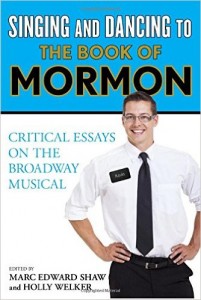 Since its opening, the Book of Mormon musical has been surrounded by controversy over its degree of vulgarity, its treatment of Mormons, and various other issues. It has also been tremendously popular in the US and abroad, notably sweeping the Tony Awards. It’s natural to ask whether it’s just fluff appealing to the lowest common denominator or whether there’s some substance there — and if there’s substance, let’s tease it out and have a look.
Since its opening, the Book of Mormon musical has been surrounded by controversy over its degree of vulgarity, its treatment of Mormons, and various other issues. It has also been tremendously popular in the US and abroad, notably sweeping the Tony Awards. It’s natural to ask whether it’s just fluff appealing to the lowest common denominator or whether there’s some substance there — and if there’s substance, let’s tease it out and have a look.
Welker and Shaw’s book Singing and Dancing to the Book of Mormon does just that. They’ve collected a remarkable set of original essays by various authors analyzing every facet of the play including its treatment of Mormon culture and beliefs, its treatment of Africans and women, its messages about faith in general, its use of bawdy humor, its illustration of Joseph Smith’s techniques and trajectory through the character of Elder Cunningham, and many other points.
Even for those of us who have been following the online discussion of this musical, there are plenty of fascinating new ideas in this collection. In the discussions I’ve read online, the consensus has generally been that the errors in the portrayal of Mormonism are small and superficial, especially compared with the deeper cultural themes the play got right. Some essays in this book expand upon that point, but I think the book really shines when the authors go beyond the obvious question of “Is it fair to Mormons?” and start to tackle its treatment of other groups. Here’s a taste:
As Max Perry Mueller writes in the Harvard Divinity Bulletin, “Say what you will about the accuracy of the ‘Africans’ depicted in The Lion King musical, at least ‘Hakuna Matata’ actually means something in Swahili.” “Hasa Diga Eebowai” is akin to a modern Broadway musical, set (for example) in China, including a number entitled “Ching Chong Bing Bong”—-an unthinkable occurrence. Yet, because this is Africa, this cultural appropriation receives a pass from its predominantly white audience.
and:
More shocking and upsetting still was seeing Nabulungi reduced to an accessory—not someone who assists in accomplishing an action, like an accessory to a crime, but in the sense of being an object that completes an outfit. Nabulungi does something that’s a punch line in “You and Me (But Mostly Me)”: she literally stands next to [Elder Cunningham] and watches.
One of the running jokes in the musical is the white Mormon missionaries’ ignorance about Africa — yet ironically the musical itself is just as ignorantly Eurocentric, treating Africa and Africans as cardboard cut-outs whose real-life counterparts are irrelevant and uninteresting to the (white) audience. As much as I want to love this play for how well it nailed so many aspects of Mormon culture that I remember from my Mormon upbringing, I can’t overlook its blind spots and treat them as minor issues. I’m glad to see that this book gives those questionable points some serious scrutiny.
I’d like to thank the editors and authors of this book for their insights. I recommend this book to anyone who enjoys textual analysis and has an interest in the musical.
[disclosure note: I am listed in the acknowledgements of this book for having provided some feedback on one of the essays.]
Thanks for this review. It sounds like an interesting read as well as a balanced critique. When I saw the play in 2011 I thoroughly enjoyed it, but I did notice that the satire never touched on the subservient role of women in the culture. Interesting that one of the anthology contributors points out that the play actually validates that subservience in the role of the female lead.
I’ve read LDS reviews – Michael Otterson’s in particular – that criticize the play for being unfair to Africans. Up until now, I’ve rolled my eyes at this claim since it seemed like a disingenuous invention by representatives of an institution with its own history of racial prejudice. However, the “mock Swahili” observation is a good one. I’m embarrassed that I didn’t notice it myself, since, as the writer points out, I surely would have taken offense at the “mock Chinese.”
That being said, I love the Book of Mormon (musical) and am happy to see that people are still writing and talking about it!
Donna, yeah that’s part of what is so disappointing about this. I want to roll my eyes at Michael Otterson (who has been so wrong on so many things), but I am not going to make excuses when my team gets it wrong and does harm instead of good. My two or three all-time favorite Broadway songs of all time are from this piece — which is why it makes me sad that they didn’t bother to make the effort to get it right on characters outside their particular focus.
I remember listening to the NPR interview with the creators (between the moment that I learned-and-loved the soundtrack and the moment I saw it live), and when they said that that song was nonsense words and that they’d just picked Uganda as a generic worst place ever, I was disappointed and apprehensive. I wish my fears hadn’t been realized…
Thank you, Chanson, for this insightful review. 🙂
My pleasure! 😀